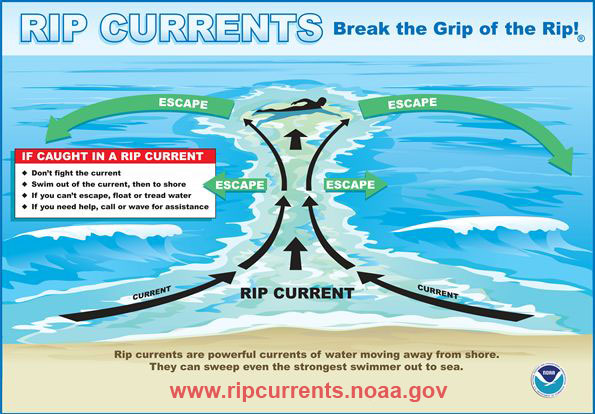Please help the National Weather Service spread these important safety messages on social media! Everyone is welcome to use the text and images provided below to help the NWS build a Weather-Ready Nation.
Facebook
The United States Lifesaving Association estimates that over 100 people die each year due to rip currents in the U.S. This spring break, Break the Grip of the RipⓇ! www.ripcurrents.noaa.gov/ #SpringSafety #BeachSafety
Twitter
Over 100 people per year die due to rip currents. Break the Grip of the RipⓇ!https://1.usa.gov/QZIviu #BeachSafety #SpringSafety

Facebook
Stay safe this spring break! From strong rip currents and dangerous marine life, discover the Nine Dangers at the beach. http://oceanservice.noaa.gov/news/features/july13/beachdangers.html #BeachSafety #SpringSafety
Twitter
Stay safe this spring break! Discover the Nine Dangers at the beach. https://1.usa.gov/1GIfD3L #BeachSafety #SpringSafety

Facebook
Stay safe this spring break! Only swim at beaches with lifeguards on duty. The chance of drowning at a beach with lifeguards is 1 in 18 million.http://www.ripcurrents.noaa.gov/ #BeachSafety #SpringSafety
Twitter
Stay safe this spring break! Only swim at beaches with lifeguards on duty.http://www.ripcurrents.noaa.gov/ #SpringSafety #BeachSafety

Facebook
This spring break, don’t forget the sunscreen! Protect yourself from getting burned. www.weather.gov/heatsafety #BeachSafety #SpringSafety
Twitter
This spring break, don’t forget the sunscreen! Protect yourself from getting burned. www.weather.gov/heatsafety #BeachSafety #SpringSafety

Facebook
The United States Lifesaving Association (USLA) advises beachgoers to enter the water feet first. The USLA says, “serious, lifelong injuries, including paraplegia, occur every year due to diving headfirst into unknown water and striking the bottom.” Check for depth and obstructions before diving.www.weather.gov/beach #BeachSafety #SpringSafety
Twitter
This spring break, avoid injuries at the beach by always entering the water feet first.www.weather.gov/beach #BeachSafety #SpringSafety

Sneaker waves are unpredictable waves which happen most often on the west coast. They are large waves which can appear without warning and travel much farther up the beach than normal, even when the ocean seems calm. When at the beach, always stay alert and weather ready. http://www.ripcurrents.noaa.gov/beach_hazards.shtml #BeachSafety #SpringSafety
Twitter
Sneaker waves are unpredictable waves which happen most often on the west coast. http://www.ripcurrents.noaa.gov/beach_hazards.shtml
